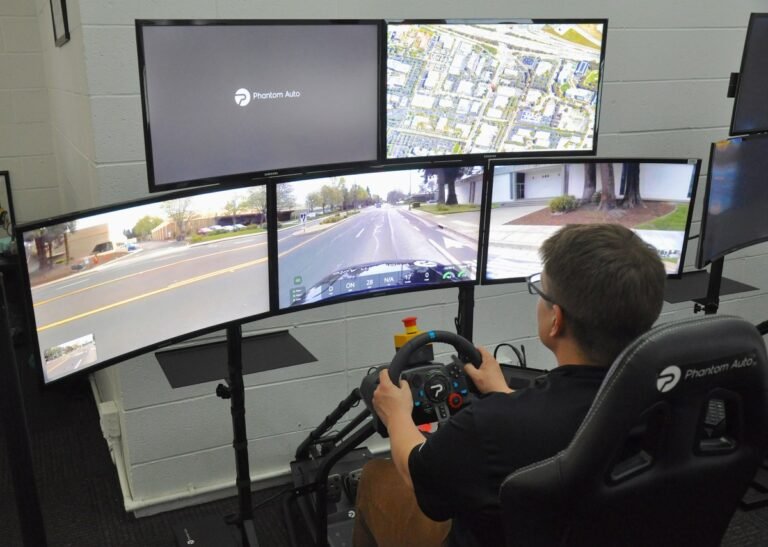
Phantom Auto, a remote driving startup that launched seven years ago amid the buzz of autonomous vehicle technology, is shutting down after failing to secure new funding, TechCrunch has learned.
Phantom Auto, which had cut staff last year, employed a little more than 100 people as of this week.
Phantom Auto’s demise is the latest in a long line of startups that popped up as the autonomous vehicle technology industry gained attention and investment from investors.
Phantom Auto was founded in 2017 and initially focused on applying its teleops technology to autonomous vehicles on public roadways such as robotaxis and self-driving trucks.
Phantom Auto pivoted in 2019 and started shopping its remote driving system to logistics, specifically forklifts and yard trucks that have no autonomy as well as autonomous sidewalk delivery robots.

DoorDash hopes to reduce verbally abusive and inappropriate interactions between consumers and delivery people with its new AI-powered feature that automatically detects offensive language.
Dubbed “SafeChat+,” DoorDash is leveraging AI technology to review in-app conversations and determine if a customer or Dasher is being harassed.
The feature is an upgrade from SafeChat, where DoorDash’s Trust & Safety team manually screens chats for verbal abuse.
The company tells TechCrunch that SafeChat+ is “the same concept [as SafeChat] but backed by even better, even more sophisticated technology.
It can understand subtle nuances and threats that don’t match any specific keywords.”“We know that verbal abuse or harassment represents the largest type of safety incident on our platform.

MIT professor Mike Stonebreaker has been at the forefront of database technology for over 50 years.
Now 80, he knows a thing or two about database technology and launching companies.
His latest project, DBOS, puts the database at the center of the software stack, reducing the operating system to a small kernel of low level functions.
“The genesis of the project was OLTP (online transaction processing) database systems have gotten a lot faster in the last 15 years.
And so the thesis was that they would be competitive as a new operating system stack,” he told TechCrunch.

Kurs Orbital, a startup founded by Ukrainian space industry veterans, has closed a new tranche of funding to accelerate the commercialization of its satellite servicing technology.
The two-year-old company aims to unlock a new era for human activities in space by enabling capabilities like satellite relocation and inspection, de-orbiting and space debris removal.
Unlike other firms developing in-space servicing tech, Kurs Orbital’s module will be able to attach to “non-cooperative” targets, or target spacecraft that aren’t fitted with any hardware in advance.
On-orbit servicing has gained attention in recent months after the failure of a handful of high-cost, high-profile satellite missions.
We believe that one of the next big steps in space will be multimodality, as we know it on Earth.

Accenture announced today that it would acquire the learning platform Udacity as part of an effort to build a learning platform focused on the growing interest in AI.
While the company didn’t specify how much it paid for Udacity, it also announced a $1 billion investment in building a technology learning platform it’s calling LearnVantage.
While it could also offer more general technology training, the company made clear that it is particularly interested in offering training to get workers up to speed on AI.
As for Udacity, which was founded in 2011, it gave the usual kinds of statements a company makes when it gets acquired by a much larger organization like Accenture.
That is, it believes that it can reach more people and help them acquire skills at part of the larger entity.

However, Apple is today announcing a handful of smaller concessions driven by feedback from its app developer community, it says.
In addition, the move to opt into the DMA terms is no longer a one-way switch.
However, these changes don’t address the major complaints with Apple’s DMA rules, which involve reducing commissions on App Store purchases in favor of other new fees.
Before, Apple was requiring that corporations sign up each membership it controls if it chose to opt into the DMA rules.
It also says apps that don’t comply with its guidelines will be blocked from installation — including via alternative app marketplaces.

Prior to this, she worked in biotech, using AI to find medical treatments for rare diseases.
She also co-founded a data science consultancy and is a founding trustee of DataKind UK, which helps British charities with data science support.
We ask this question a lot at the Ada Lovelace Institute, which aims to make data AI work for people and society.
How can investors better push for responsible AI?
By asking questions about their investments and their possible futures – for this AI system, what does it look like to work brilliantly and be responsible?

In May 2019, Ultrahaptics and Leap Motion became Ultraleap (not to be confused with Magic Leap, which operates in the same space).
“I think it’s a long-term vision for XR,” Carter said of the deal.
Founded by a pair of University of Bristol students three years after Leap Motion, Ultrahaptics harnesses ultrasound waves to create tactile feedback.
Much like the earlier Leap Motion product, it would be possible to mount a device to the front of the visor, but directionality is important.
The Leap Motion tech determines your hands’ orientation in space, while haptics provide tactile feedback when you come into contact with the virtual object.

Anamorph, a new filmmaking and technology company, announced its launch today.
Plus, there are certain scenes pinned to the same timeslot in each version, including the scene where Eno discusses generative art.
“We just let the generative platform run wild with Eno’s entire music catalog and all the footage and no rules.
“The platform selects and sequences edited scene files, but it also builds its own pure generative scenes and transitions, creating video and original 5.1 audio elements dynamically.
He also stresses, “This is a generative system, not generative AI.

The startup built its platform on top of the open source Stable Diffusion model, letting users enter text-based prompts to generate their creations.
The company was founded by Darya Sesitskaya, a former Snap design lead responsible for designing Snapchat’s AR camera, Lens Studio, Lens Cloud, and more.
She also worked at Wanna (formerly Wannaby), an AR technology company known for its virtual try-ons for sneakers, clothing, and watches.
Since launching its beta version, Shader has garnered approximately 3,000 downloads.
In the near future, we also plan to implement the ability to create voice-to-AR effects and 3D background replacements,” says Sesitskaya.













